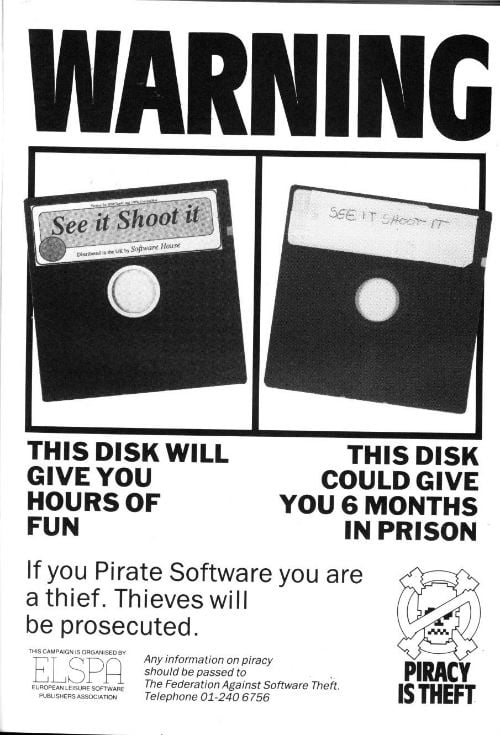Piracy is by no means a new phenomenon. The entertainment industries have been concerned by unauthorized copying for several decades, and still are. Anti-piracy campaigns are not new either, and today we take a look at some classic examples from the early '90s.

Every now and then it can be quite amusing to look back at some of the anti-piracy campaigns deployed by rightholders in the past. Especially, when contrasted with newer initiatives.
Last week we reported on a new UK campaign where suspected pirates will get an “educational alert” in the mail if they are ‘caught’ sharing infringing content using BitTorrent.
The initiative breaks with the more aggressive traditions of scaring pirates with high fines, and rewarding snitches who tell on them, although there are still some remnants of this around.
How different was this in the early ’90s when the (now defunct) European Leisure Software Publishers Association (ELSPA) ran a controversial series of ads, warning pirates of potential jail time.

In an attempt to connect with a predominantly young audience, ELSPA also promoted a series of cartoon PSAs in UK computer magazines.
These ads informed readers that “piracy is theft” and encouraged them to report suspicious behavior to the Federation Against Software Theft (FAST). In return, the informants could look forward to a £1,000 reward.

The cartoons showed teens how they could report suspicious software sellers at a local market, or even teachers who dare to allow students to make copies.

Or what about friends, who ‘gang up’ on people so they can score a sizable reward? It was all possible, if the cartoons were to believed.

If ELSPA’s goal was to be noticed, the ads were definitely successful. Soon after the first ones were placed, angry parents started writing letters to computer magazines, including this one Commodore Format received in the early ’90s.
“I would like to strongly object to the advert which appeared in your magazine,” a concerned parent wrote.
“It encourages young, vulnerable children to think that a phone call will lead to £1,000 very easily. It has caused a lot of ill feeling where I live between boys who were friends and then fell out, and thought this was a way to get back at one boy causing unnecessary upset to the families.”

ELSPA responded in the magazine and argued that these types of ads were needed to counter the growing threat of piracy. While the organization suggested that the cartoons were instrumental in lowering piracy rates, we now know that it certainly didn’t stop the copying.
Not even SIIA’s Don’t Copy that Floppy!, one of the all-time anti-piracy classics that turns 25 this year, could manage that.
In the years that followed many similar campaigns were launched, some more aggressive than others. And while the “piracy is theft” mantra is still in circulation, the general sense is that a ‘scare approach’ is not all that productive.
Perhaps this is one of the reasons why the latest UK anti-piracy effort relies more on carrots than sticks. Whether that will be successful has yet to be seen, but it’s certainly less “amusing.”

—
The advertising images published here were sourced from WoS, where you can find some more examples. The Commodore Format scan is courtesy of the CF Archive.
Source: TorrentFreak